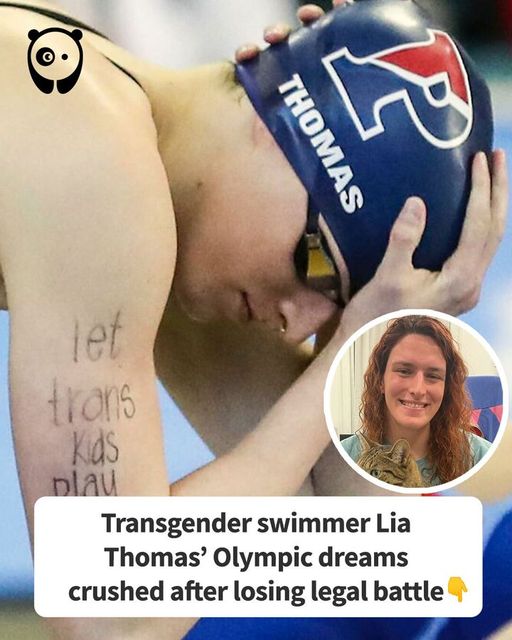Lia Thomas’ retirement from competitive swimming has raised eyebrows and sparked heated debate in the sporting world.
What many saw as a personal decision is unfolding as a pivotal moment in the ongoing fight for fairness, inclusion, and the very essence of competitive sport. The emotional toll he talks about, citing feelings of loneliness and a constant struggle for acceptance.
may sound familiar to some, but it’s part of a much larger conversation about how society, policymakers, rs, and the sports community, in general, navigate the complexities of gender and identity.
Could her departure be more than just a personal crossroads? Is this an inevitable consequence of the tensions that surround transgender athletes in the competitive environment? As we examine Thomas’ emotional exit from the sport, we are forced to wonder if this is just the beginning of a wider transformation that may change the landscape of sport and identity forever.
Renowned swimmer Lia Thomas has made the unexpected and deeply emotional decision to retire from competitive swimming, citing the emotional toll of her journey and feelings of isolation in a statement released yesterday. As a transgender athlete, Thomas has been at the center of many debates regarding the fairness, gender, and integrity of competition in women’s sports.
Thomas expressed in a statement: “The challenges I have faced have not been due to physical demands, but the constant struggle for acceptance and fairness in the sport I love. No athlete should feel marginalized or singled out for their identity instead of being recognized for their achievements.”
Her decision follows months of contentious discussions, petitions, and debates about transgender athletes in sports. Through her own experiences, Thomas has highlighted the issues transgender athletes face within and outside of their respective sports, navigating public scrutiny, political debates, and ethical issues.
Thomas’ supporters say her retirement is a significant loss for the sport and underlines the need for a thoughtful, inclusive and compassionate approach to supporting athletes facing complex identity issues. On the contrary, critics questioned its achievements, linking them to potential physiological benefits.
The sports world is now forced to examine the ethical, biological, and social factors surrounding transgender athletes as it reflects on the aftermath of Thomas’ retirement. The key question is: How will this moment affect the future of competitive sport and how will it shape the experiences of future athletes?
Thomas’ decision to quit competitive swimming isn’t just personal; it is a crucial moment that requires collective reflection on the opportunities, acceptance, and space we create for athletes, regardless of their gender identity.
Beyond the emotional challenges Thomas personally faced, her story highlights the importance of fostering an international athletics community that is fair and inclusive—one that promotes the integrity of competition while welcoming and respecting the diversity of athletes’ identities.
This applies to all athletes regardless of their gender identity or background, including those who identify as transgender.
But the problem remains: How can inclusivity and equity be effectively balanced in a field historically defined by biological differences? Thomas’ journey underscores the need to rethink sports regulations, particularly those dealing with gender identity and biological variation. Realizing that previous principles may no longer be appropriate or comprehensive for today’s and future athletes could bridge the gap between supporters and critics.
A conversation on this topic involves a complex mix of physiological, psychological, and ethical considerations that require an objective, thorough, and empathetic approach. This discussion spans a variety of contexts, from locker rooms to legislative halls, and requires input from a wide range of experts—from endocrinologists to ethicists, athletes to administrators.
The discourse around Lia Thomas is polarizing, from unwavering support to sharp criticism. Some focus on the psychological and physical issues of transition, which can be emotionally and physically draining.
Others argue that transgender women may have physiological advantages over cisgender women.
Beneath the scientific, moral, and competitive aspects of the debate lies a fundamentally human issue that must take precedence: respect and empathy for the lived experiences of all athletes, acknowledging their challenges, triumphs, and sacrifices in the pursuit of excellence.
Thomas’ retirement raises important questions and requires a comprehensive strategy that balances inclusivity with fair competition. This must take into account factors such as hormone levels, and physical characteristics and how they may affect competitive advantages or disadvantages. These questions cannot be answered simply or one-dimensionally.
We witness an athlete who has reached the pinnacle of success, but her journey has been marred by public scrutiny, isolation, and long-running disputes over her right to compete. Thomas’ decision to retire from competition offers a poignant opportunity for reflection that extends far beyond the realm of sport.
The impact of Thomas’ death will no doubt resonate throughout the sporting world, prompting athletes, governing bodies, and fans to consider how we can foster a culture that celebrates and recognizes all athletes for their dedication, talent, and achievements, without exclusion or bias.
Lia Thomas’ decision to retire from competitive swimming marks not only the end of her career but also a pivotal moment in the ongoing debate about gender, fairness, and inclusivity in sport. Her journey sheds light on the complex challenges faced by transgender athletes and offers valuable insights into the intersection of identity, competition, and societal expectations. As the sports world grapples with how to balance fairness and inclusivity, Thomas’ story underscores the need to foster an environment that honors all athletes for their talent and dedication, regardless of gender identity.
Going forward, it is imperative that sports organizations and communities engage in open, thoughtful discussions to ensure that every athlete can compete in a space that values both fairness and respect. In this way, we can begin to create a more open and compassionate future for all athletes, where the focus is on their achievements rather than their identities.



